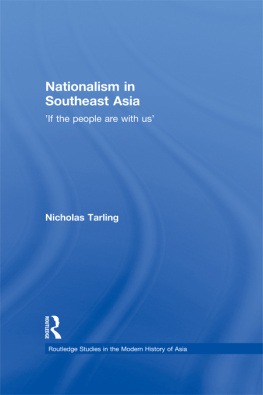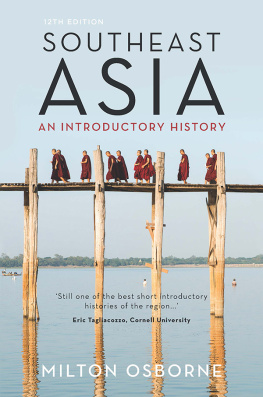Experiments with Marxism-Leninism in Cold War Southeast Asia
Edited by Matthew Galway and Marc H. Opper
Asian Studies Series Monograph 16
For Charlotte

Published by ANU Press
The Australian National University
Canberra ACT 2600, Australia
Email: anupress@anu.edu.au
Available to download for free at press.anu.edu.au
ISBN (print): 9781760465292
ISBN (online): 9781760465308
WorldCat (print): 1336522667
WorldCat (online): 1336522659
DOI: 10.22459/EMLCWSA.2022
This title is published under a Creative Commons Attribution-NonCommercial-NoDerivatives 4.0 International (CC BY-NC-ND 4.0) licence.

The full licence terms are available at creativecommons.org/licenses/by-nc-nd/4.0/legalcode
Cover design and layout by ANU Press
Cover photograph: At an anti-aircraft emplacement in a Laotian liberated area. The fighters and commanders of an air defence unit of the Laotian Peoples Liberation Army are studying Chairman Maos theories on peoples war. They praise as a great, unassailable truth Chairman Maos wise assertion that imperialism and all reactionaries are paper tigers. China Pictorial 7, 1968, page 35. Public domain.
This book is published under the aegis of the Asian Studies Editorial Board of ANU Press.
This edition 2022 ANU Press
Abbreviations
AAKC | Association dAmiti KhmeroChinoise (KhmerChinese Friendship Association) |
AEK | Association des tudiants Khmers (Khmer Students Association) |
AFPFL | Anti-Fascist Peoples Freedom League (Burma) |
ARVN | Army of the Republic of Vietnam |
BPP | Border Patrol Police (Thailand) |
CCP | Chinese Communist Party |
CID | Criminal Investigation Department |
Comintern | Communist International |
COSVN | Central Office for South Vietnam |
CPK | Communist Party of Kampuchea |
CPP | Communist Party of the Philippines |
CPT | Communist Party of Thailand |
DBA | Dobama Asiayone (We Burmans Association) |
DEI | Dutch East Indies |
DK | Democratic Kampuchea |
DRV | Democratic Republic of Vietnam |
FGR | Five Golden Rays |
FUNK | Front uni national du Kampucha (National United Front of Kampuchea) |
GMD | Guomindang |
GRUNK | Gouvernement royal dunion nationale du Kampucha (Royal Government of the National Union of Kampuchea) |
ICP | Indochinese Communist Party |
ICSC | International Commission for Supervision and Control |
LPP | Lao Peoples Party |
MCP | Malayan Communist Party |
MNLA | Malayan National Liberation Army |
MPAJA | Malayan Peoples Anti-Japanese Army |
NAM | Non-Aligned Movement |
NIS | Nederlandsch-Indische Spoorweg Maatschappij (Dutch East Indies Railway Company) |
NKPM | Nederlandsch Koloniale Petroleum Maatschappij (Dutch Colonial Petroleum Corporation) |
NLHX | Neo Lao Hak Xat (Lao Patriotic Front) |
PARI | Partai Republik Indonesia (Indonesian Republican Party) |
Partindo | Partai Indonesia (Indonesia Party) |
Pathet Lao | Lao Peoples Liberation Army |
PCF | Parti Communiste Franais (French Communist Party) |
Permi | Persatuan Muslim Indonesia (Indonesian Muslim Union) |
PKI | Partai Komunis Indonesia (Communist Party of Indonesia) |
PLA | Peoples Liberation Army (China) |
PLAT | Peoples Liberation Army of Thailand |
PNI | Partai Nasional Indonesia (Indonesian National Party) |
PRC | Peoples Republic of China |
PSII | Partai Sarekat Islam Indonesia (Islamic Association Party of Indonesia) |
RKU | Royal Khmer University |
RLG | Royal Lao Government |
RVN | Republic of Vietnam |
Sagam | Sagam Rstr Niyam (Popular Socialist Community) |
SRV | Socialist Republic of Vietnam |
UEK | Union des Etudiants Khmers (Khmer Students Union) |
US | United States |
USSR | Union of Soviet Socialist Republics |
VCP | Vietnamese Communist Party |
VSTP | Vereniging van Spoor-en Tramwegpersoneel (Association of Railway and Tram Workers) |
VWP | Vietnamese Workers Party |
WWII | World War II |
YMBA | Young Mens Buddhist Association |
Maps and plates
Foreword
Brantly Womack
The basic revolutionary question What is to be done? excites an intellectual dialectic of virtually infinite dimensions. Most immediately, there is the tension between the desired revolutionary directionwhat should be doneand the circumstances of the moment: what can be done. Each of these poles is a nest of further contradictions. What should be done is a commitment to transformation, sometimes at mortal risk to oneself, and usually shaping the activists future. Ones conviction of both the necessity of transformation and its possibility must be absolute. The critique of the present is founded on the absolute and universal validity of ideology. But an ideology is not a simple moment of enlightenment. There are various texts, various teachers and various revolutionary experiences elsewhere. What to believe absolutely? Whose teaching or example should be followed? But these questions do not address the current practical problem the activist faces of what can be done now. Do we wait for the proper moment? Do we join with other critics even though their ideas are different? Do we compromise with incumbent forces? How should we organise? To some extent the theories, teachers and examples suggest answers, but they are often conflicting, and never dealing with this place, this point in time. Compared with Mao Zedong or H Ch Minh, Hamlet had it easy.
Trying to understand the thinking and actions of revolutionaries is important because they stand at the forward edge of what was imagined to be possible in their societies in their times. Regardless of whether they succeeded, they marked a limit of imagined possibilities. As the editors point out in the Introduction, at the time most of the close interest of outsiders (other than fellow revolutionaries) was in defending the existing orderto know their enemy to defeat it. But from a greater historical distance it is important to get inside the minds and organisations of the revolutionaries to grasp a vital part of the vivid present of their societies. How urgent did its problems seem? Which thinkers were attractive, and why? How did they view their interactions with other groups, and with international revolutionaries? In what respects were they original in their adaptations of general theories? Could they make the claim Mao made, that their thoughts were the creative application of Marxism-Leninism to the circumstances of their societies? Did they make that claim?











